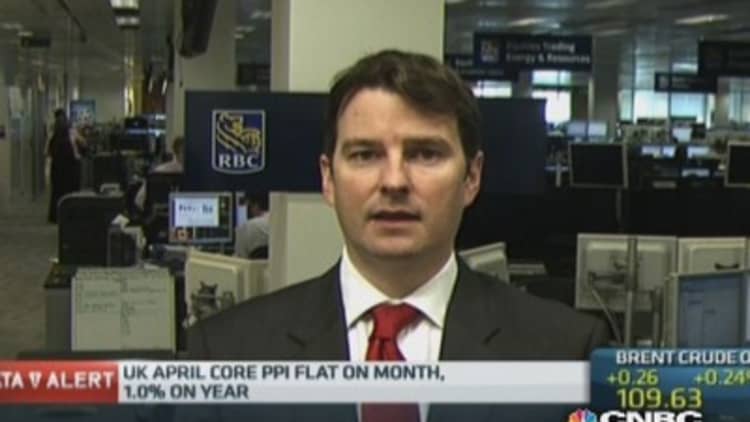The cost of living in Britain edged up more than expected in April, although it remained below the Bank of England's target of 2 percent.
Consumer prices rose 1.8 percent year-on-year, the U.K's Office for National Statistics (ONS) said on Tuesday, above analyst forecasts of 1.7 percent. The move higher comes after inflation hit its lowest level since October 2009 in March, rising by just 1.6 percent year-on-year.
Sterling rose against the dollar on the news, and 40 minutes after the release was trading 0.11 percent higher.

Sterling hits 1-month low on BoE inflation report
The ONS said rising transport costs - air fares and gasoline in particular - had boosted the rate of inflation, and offset an overall drop in the price of food.
"The increase in inflation is largely down to a period this year where petrol prices have been flat, compared with the same month last year when they fell," Ben Brettell, economics editor at Hargreaves Lansdown financial services firm, said in a note.
The rise in the cost of living, however, takes inflation back above the rise in wages.
Last week, official data revealed that pay including bonuses was 1.7 percent higher than a year earlier in the three months to March. This marked the first time since 2010 that wage growth had risen by more than inflation.
Bank of England in focus
In its inflation report, published last week, the Bank of England (BoE) kept its outlook for inflation unchanged, saying it expects it to reach its target in two years' time.
Read MoreBoE plays down earlier rate hike expectations
But Howard Archer, chief U.K. economist at IHS Global Insight warned not to read too much into April's rise in the cost of living.
"It highly unlikely to mark the start of a significant upward trend in inflation," he said in a note.
The higher inflation figure comes amid increasing signs of a pickup in the U.K.'s economic recovery, which have led some to call for a hike in interest rates.
Last week, official data revealed that U.K. unemployment fell to 6.8 percent in the first quarter of this year - its lowest level in over five years. While in the first quarter of this year, Britain posted gross domestic product (GDP) growth of 0.8 percent quarter-on-quarter.
Earlier this month, the BoE opted to leave interest rates and asset purchases unchanged at its monthly monetary policy meeting, but there are growing calls for a hike in interest rates sooner rather than later.
Read MoreUK jobless rate hits lowest in more than 5 years
Despite this, Archer stressed that inflation of 1.8 percent is in line with the BoE's expectations and remains below the target level.
"Consequently, we doubt that April's increase in inflation will significantly alter the Bank of England's thinking on when to start edging interest rates up," he said.
"It still looks most likely to us that the Bank of England will start edging up interest rates around spring 2015."


